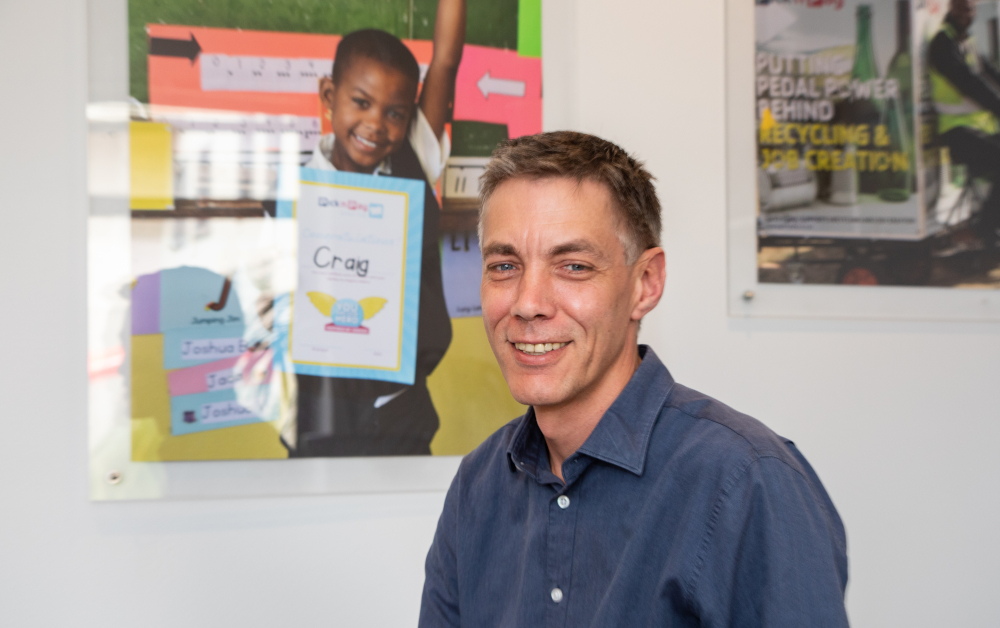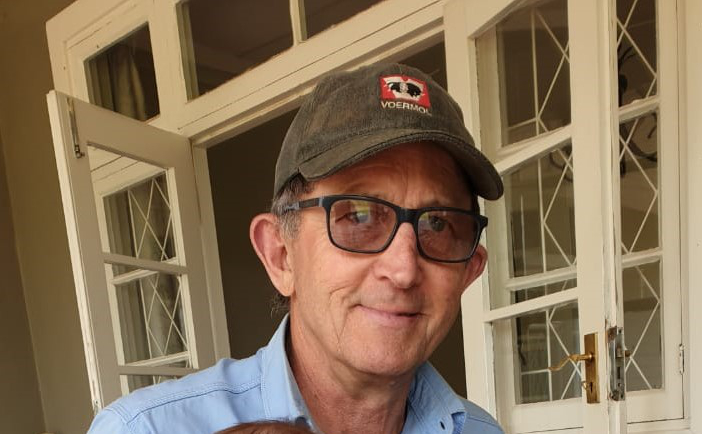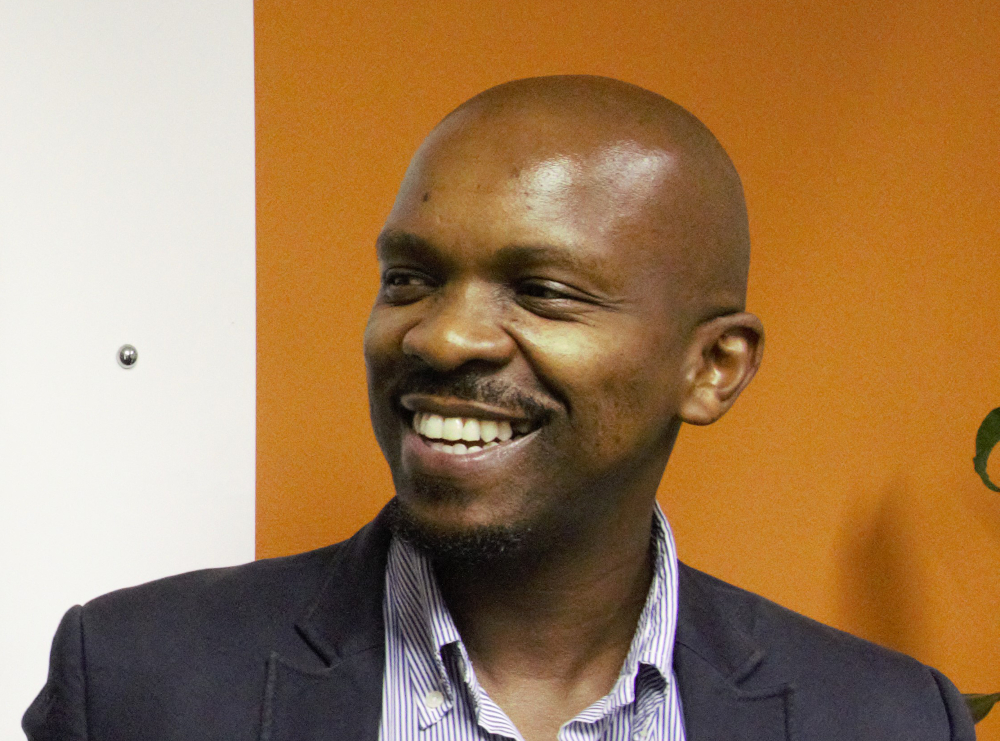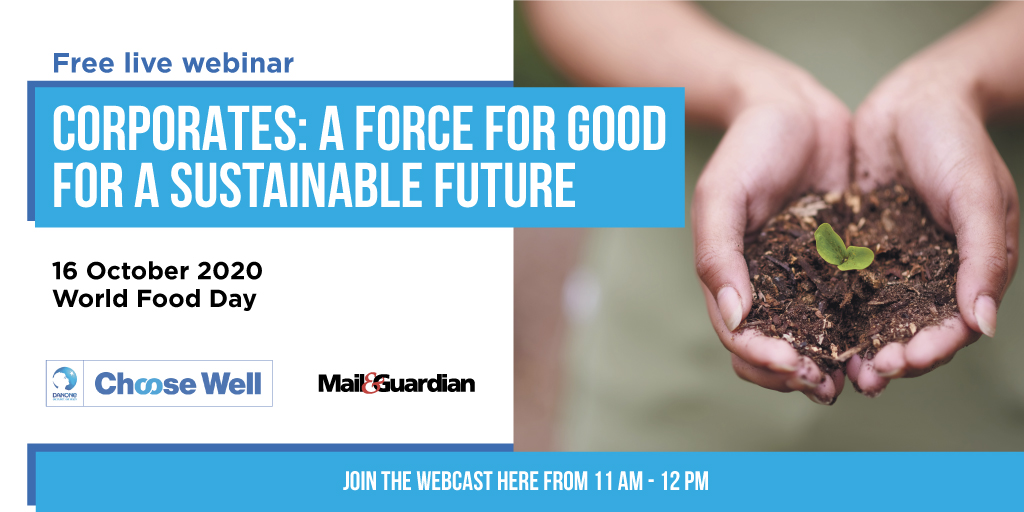Marlinie Kotiah, General Secretary Director of Danone
This Mail & Guardian webinar was sponsored by Danone Southern Africa. Speakers included Marlinie Kotiah, GS Director, General Secretary, Danone Southern Africa; Mkhululi Silandela, Head of Sustainable Agriculture & Smallholder-Support programme at The World Wide Fund for Nature (WWF); Andre Nel, Head of Sustainability at Pick n Pay; and James Kean, owner of Mearns Farming and Chairman of uMati, Midlands Agricultural Transformation Initiative. The webinar was moderated by Marcelle Gordon, Anchor for TV news channel eNCA.
The time for speaking about nutrition has never been more relevant, said Marlinie Kotiah, General Secretary Director of Danone. As the world emerges from the Covid-19 pandemic, the way people eat has come under the spotlight, observed the nutritionist and scientist turned business leader.
“During Covid, food became medicine, because we were talking about comorbidities like diabetes, heart disease and being overweight — all risk factors that make it important to eat well.”
Speaking as a panellist at a webinar titled Corporates: A Force for Good for a Sustainable Future on World Food Day (October 16), Kotiah joined sustainability experts from the World Wide Fund for Nature (WWF), a milk farmer and Pick n Pay to discuss some of the ways in which food, corporate efforts and sustainability intersect.
Kotiah says that she observed an increase in healthy eating behaviour as the pandemic spread.
 Andre Nel is the Head of Sustainability at Pick n Pay
Andre Nel is the Head of Sustainability at Pick n Pay“I saw people buy bags of oranges, looking for products that were fortified with zinc and Vitamin D,” she says. “I was encouraged that people were paying more attention to what they were putting into their grocery baskets.”
But how does a person think about nutrition when they’re not even sure that they’ll have any food on the table come dinner time?
Even though South Africa is ostensibly a “food secure” nation, meaning that it produces enough calories to feed each one of its citizens, a 2013 Oxfam report estimates that one in four people experience hunger.
In order to address this pressing issue, co-operation is paramount, said Andre Nel, Head of Sustainability for Pick n Pay. “We’ve got really diverse companies coming together, not for any gain, no one is making any profit,” said Nel. “It’s really just getting together to get food for people who have nothing out there,” he said. The same collaborative mentality needs to be leveraged in order to further sustainability in South Africa.
“The way sustainability works today is that there’s a lot of isolation; a lot of silos,” he said. “I think what Covid-19 has shown us is that we are all connected … but not really in the way that we should be.”
Mkhululi Silandela, Head of Sustainable Agriculture and Smallholder-Support programme at WWF South Africa, agreed. “It has taken Covid for us to realise that the relationship between humans and nature is actually so broken,” he said.
 James Kean, owner of Mearns Farming
James Kean, owner of Mearns Farming“And what that requires is a strong focus on partnerships. Our vision is to see people and nature thrive. In order to achieve that, we cannot act alone.”
For James Kean, the owner of Mearns Farming, acting together not only means using new, sustainable ways to produce dairy, but also passing these skills on to the younger generation. At any given time, the farm hosts numerous student farmers.
These youth are given the opportunity to gain “grassroots experience through the opportunity of hard farm work,” said Kean. The students are able to learn from people with decades of experience, and “everybody gains” in the process.
Kean said that teaching students has accelerated his quest to do things sustainably. “Teaching workers to understand farming complexities really drives me to accelerate the processes of improving the health of the soil, irrigation efficiencies, and decreasing power consumption,” he said. At the same time, by creating internships, the farm is “empowering local communities and providing purpose”.
 Mkhululi Silandela is the Head of Sustainable Agriculture & the Smallholder-Support programme at The World Wide Fund for Nature
Mkhululi Silandela is the Head of Sustainable Agriculture & the Smallholder-Support programme at The World Wide Fund for NatureKean noted the knock-on effect of sustainable practices: “By generating healthy soil, we grow more healthy pastures, with less fertiliser, chemicals and less water. We produce more nutritious milk, more efficiently.”
Ultimately, Danone (which buys their milk) is then able to produce a more nutritious product. It’s one powerful example of the virtuous cycle of planet-friendly practices: consumers eating healthier food and financial wins for the company.
“We’ve discovered that working to enhance the environment actually improves the economics of farming in the long-term,” said Kean.
Kotiah highlighted another virtuous cycle that companies can introduce to their operations: shifting the way they package their products. “We’ve been looking at light-weighting our packaging, removing excess packaging and making sure that we use packaging that is more recyclable,” she said.
Last year, the company transformed every single Nutriday one-kilogram tub from polystyrene (PS) to polypropylene (PP). By implementing that one decision, the company diverted 700 tonnes of plastic from landfill. “That’s the weight of a hundred elephants,” said Kotiah.
The company is concerned with the idea of circularity, she said: asking questions around how to make packaging go back either into itself, or into something else. “We are also working with other innovators to give plastic a second life.”
When companies take responsibility for their products and their packaging, that’s when real change is garnered, observed Silandela. “It is only when people are accountable for their products that we will see action and solutions on the ground,” he opined.
Nel hopes that the pandemic has given way to more of this kind of forward-thinking. “We keep trying to stop things: stop the degradation; stop the hunger,” said Nel. The pandemic could be the catalyst for us to shift our focus from a reactive stance to a more forward-looking approach.
“Perhaps after Covid-19, we’ll start focusing a little bit more [on] regeneration.”
